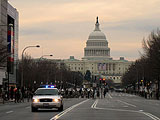Costs of war: The security blanket
By Shaun Waterman for ISN
My adopted home town has become an armed camp.
Helicopters clatter overhead constantly; the air exclusion zone around the center of the capital is being expanded and tightened; the US Coast Guard has closed portions of the Potomac River; and miles of roads, large parts of downtown and all the bridges from Virginia will be sealed off from vehicular traffic.
To get to the route of the inaugural parade, the huge crowd of spectators - variously estimated at between one and four million - will have to pass through checkpoints and metal detectors and enter a special 3.5 square-mile exclusion zone from which strollers, umbrellas and folding chairs, among other objects, are banned. They will be subject to what local transit officials are calling expected “crush conditions” on the city’s subway, and have to cope with forecast freezing temperatures and possible snow.
They will also have to brave bomb-sniffing dogs, horses trained in crowd control, thousands of security cameras, roof-top sharpshooters, undercover teams of specially trained federal agents and special sensors to detect chemical, biological and radiological material.
Twenty-thousand police and military personnel from 58 different federal, state and local agencies will be deployed in what is the tightest security operation ever staged at a presidential inaugural.
Although troops from the Continental Army escorted the first ever US president George Washington to his swearing-in ceremony at Federal Hall in New York City in 1789, their role was largely ceremonial.
Security considerations have probably not had such an intrusive impact on the inaugural since April 1861, when Abraham Lincoln was secretly brought into Washington in the middle of the night by Pinkerton security agents - whose job it was to protect the president before the US Secret Service assumed the task.
Now, the Secret Service will handle the logistical nightmare of coordinating nearly five dozen agencies, working out of a special command center, where officials from all the agencies can communicate and work together, and will share what responders call a “common operational picture” in the event of any crisis.
"Everyone has a common picture of what is going on," Homeland Security Secretary Michael Chertoff told CNN of the multi-agency center. "If something arises, we know who has the ball. We know who plays a supporting role. If an issue that is not anticipated comes up, we are in the room; we can figure out what do; we can make a decision."
Chertoff said that at least 20,000 national guardsmen would be in reserve. That is in addition to 8,000 local police officers from Washington and surrounding jurisdictions, 10,000 National Guard troops, 1,000 FBI personnel and hundreds of other federal agents from the Department of Homeland Security, the National Park Service and the US Capitol Police.
Also in reserve, according to the New York Times, teams of intelligence analysts, evidence response technicians, bomb experts, cyber-security specialists, hostage negotiators, emergency medical personnel and SWAT units - tucked away out of sight in case they are needed.
Also out of sight, more than 150 teams of plainclothes intelligence agents working throughout the region including at subway, train and bus stations in the outer suburbs of Virginia and Maryland. The agents, with special training to spot suspicious behavior, will be moving through the crowds looking for potential suicide bombers or gunmen.
Fighter jets will fly overhead along with police helicopters; Coast Guard boats equipped with automatic weapons will patrol the Potomac River; and troops will man surface to air missile batteries.
Officials say there is no intelligence or other indication about any credible threat to the inauguration, either from foreign terrorists like al-Qaida or from domestic extremists like white supremacist groups. However, Joseph Persichini, head of the FBI’s Washington office, told the Times that intelligence was being assessed and reassessed every day.
“This is a global event,” Persichini said, “Everybody feels the urgency. We continue to believe the threat is low, but no lead goes untouched.”
Obama’s election resulted in a spike of so-called chatter on white supremacist websites - “more crazy even than usual,” was how one person who monitors ultra-right Internet activity characterized it to ISN Security Watch.
In response, agents in the FBI’s 56 field offices across the nation have been told to review all their files on such groups and individuals and contact any informants or other sources in an effort to uncover any possible plots or other potential trouble, Persichini told the Times.
Several media outlets have reported that the scenario which most worries authorities is a single attacker acting on his own - a so-called “lone wolf” scenario - and the panic and chaos any kind of gunfire or other incident might provoke in the tightly packed crowds.
Congressional staffers and others involved in the actual inauguration activities will find it just as hard as spectators to get into town, and many are planning to sleep Monday night in their offices. One Senate staffer told CNN many of her colleagues were holding Capitol Hill office slumber parties.
"If we're lucky, we'll be able to come home near midnight the next day after they reopen the bridges to Virginia," she said.
Local radio host and blogger Adam Tuss offered the following advice recently: “Note to self. Stay at home, if at all possible, on Jan. 20."

